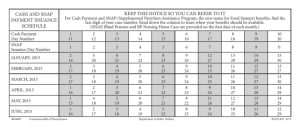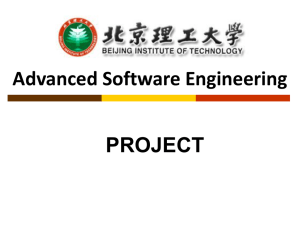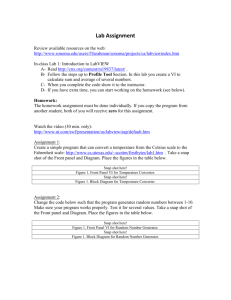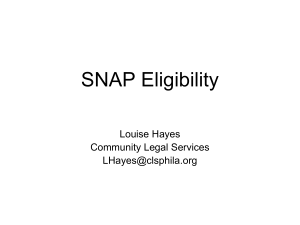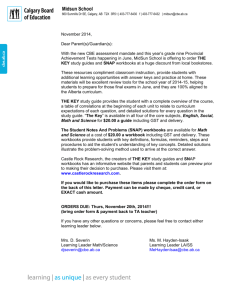Regulatory Compliance & Insider Trading Policy
advertisement
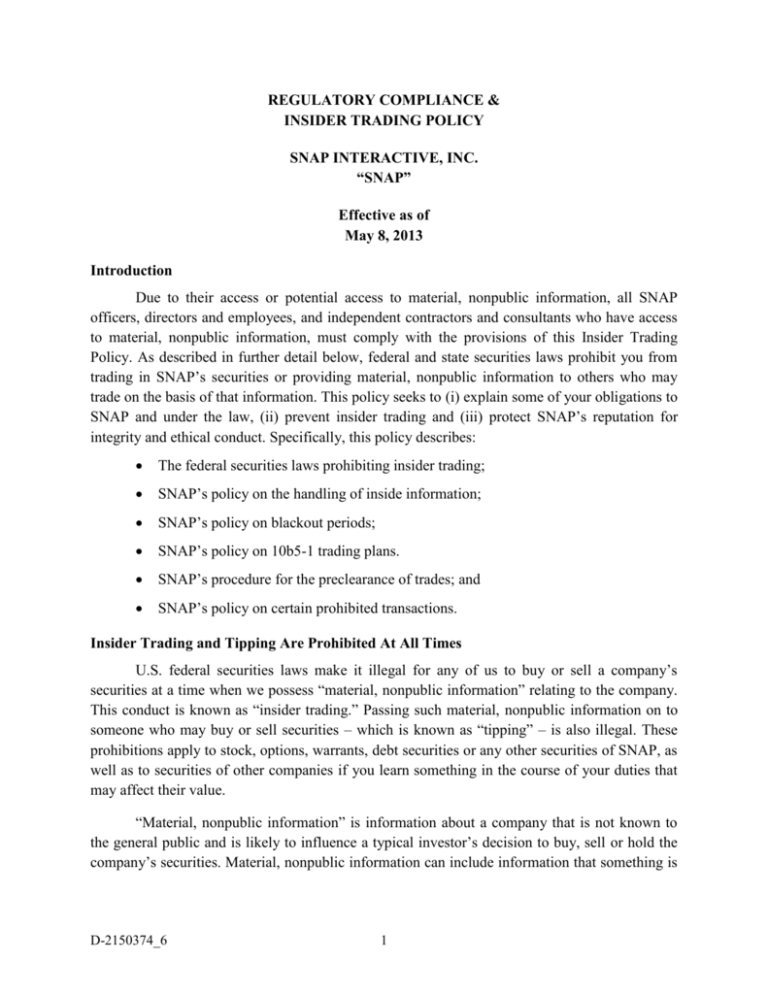
REGULATORY COMPLIANCE & INSIDER TRADING POLICY SNAP INTERACTIVE, INC. “SNAP” Effective as of May 8, 2013 Introduction Due to their access or potential access to material, nonpublic information, all SNAP officers, directors and employees, and independent contractors and consultants who have access to material, nonpublic information, must comply with the provisions of this Insider Trading Policy. As described in further detail below, federal and state securities laws prohibit you from trading in SNAP’s securities or providing material, nonpublic information to others who may trade on the basis of that information. This policy seeks to (i) explain some of your obligations to SNAP and under the law, (ii) prevent insider trading and (iii) protect SNAP’s reputation for integrity and ethical conduct. Specifically, this policy describes: The federal securities laws prohibiting insider trading; SNAP’s policy on the handling of inside information; SNAP’s policy on blackout periods; SNAP’s policy on 10b5-1 trading plans. SNAP’s procedure for the preclearance of trades; and SNAP’s policy on certain prohibited transactions. Insider Trading and Tipping Are Prohibited At All Times U.S. federal securities laws make it illegal for any of us to buy or sell a company’s securities at a time when we possess “material, nonpublic information” relating to the company. This conduct is known as “insider trading.” Passing such material, nonpublic information on to someone who may buy or sell securities – which is known as “tipping” – is also illegal. These prohibitions apply to stock, options, warrants, debt securities or any other securities of SNAP, as well as to securities of other companies if you learn something in the course of your duties that may affect their value. “Material, nonpublic information” is information about a company that is not known to the general public and is likely to influence a typical investor’s decision to buy, sell or hold the company’s securities. Material, nonpublic information can include information that something is D-2150374_6 1 likely to happen – or just that it might happen. Examples of material, nonpublic information with respect to SNAP include, among other things, nonpublic information about: Operating or financial results; Known but unannounced future earnings or losses; Projections of future earnings or losses, or other earnings guidance or targets; Earnings that are inconsistent with the consensus expectations of the investment community; The potential or actual gain or loss of a significant customer, supplier, contract or purchase order; Joint ventures and distribution agreements; A pending or proposed merger, acquisition or tender offer; Changes in SNAP’s senior management, auditors or Board of Directors; Plans for substantial capital investments or a pending or proposed acquisition or disposition of a significant asset; Litigation, whether pending or threatened, and any positive or negative developments thereof; A change in dividend policy, the declaration of a stock split, an offering of additional securities or the redemption or repurchase by SNAP of its securities; Corporate restructuring, impending bankruptcy or the existence of liquidity problems; or Any other information which is likely to have a significant impact on SNAP financial results or stock price. If you possess any material, nonpublic information, even if you are not in a blackout period, the law and this policy require that you refrain from buying or selling SNAP’s securities until after the information has been disclosed to the public and absorbed by the market (in most cases, the first safe day to trade is the third trading day after the public disclosure of such information) or is no longer material. This is true even if you do not trade such securities for your own benefit. It is also a violation of the law if such trading is done by another person to whom you disclosed the inside information prior to full public disclosure. In addition, it is also a violation of this policy if you communicate any material, nonpublic information about SNAP to any other person, including family and friends. D-2150374_6 2 Legal Consequences of Violation Insider trading violations are vigorously prosecuted by the Securities and Exchange Commission, the Department of Justice and state enforcement authorities. Punishment for insider trading violations is severe, and could include any combination of the following: A civil penalty of up to three times the profit gained or loss avoided; Substantial criminal fines of up to $5,000,000; and Imprisonment for up to 20 years. In addition, persons who violate this policy may be subject to disciplinary action by SNAP, including termination of employment, whether or not the failure to comply with this policy results in a violation of law. Handling Inside Information It is very important that any information which reasonably could be expected to affect the market for SNAP’s securities be kept strictly confidential until public disclosure of such information is proper. Consequently, all such information may be publicly disclosed only with the approval of the Chief Executive Officer and/or the Chief Financial Officer of SNAP. You should not discuss or disclose confidential inside information with or in the presence of any person outside SNAP. In addition, you should also refrain from commenting on our competitors’ and customers’ business. If you have knowledge of any such information, you must preserve its confidentiality until SNAP discloses such information to the public. No Trading During the “Blackout Periods” In order to protect you and SNAP from allegations of insider trading, SNAP’s policy prohibits you from buying or selling SNAP’s securities during the quarterly “blackout periods,” which begin on the 15th day of the last month of each fiscal quarter and end on the third trading day after the public release of the quarter’s earnings. This policy is based on the presumption that, during a blackout period, you may have access to the quarter’s financial results, which are deemed material, nonpublic information until they are disseminated into the marketplace. This policy does not apply to the vesting of restricted stock nor to a cash exercise of vested employee stock options granted by SNAP during a blackout period, since the purchase price for such stock options is fixed. You are not, however, permitted to sell the shares acquired through such exercises until the blackout period ends. Transactions in your 401(k) are, for blackout period purposes, no different than transactions for your own account. D-2150374_6 3 Other Blackout Periods From time to time, other types of material, nonpublic information regarding SNAP (such as mergers, acquisitions, dispositions or new product developments) may be pending and not be publicly disclosed. While such material nonpublic information is pending, SNAP may impose special blackout periods during which you are prohibited from trading in SNAP’s securities. You will be notified if SNAP imposes a special blackout period. Exception for 10b5-1 Trading Plans The trading restrictions described above do not apply to transactions under a pre-existing written plan, contract, instruction or arrangement under Rule 10b5-1 (a “10b5-1 Plan”) that: has been reviewed and approved at least thirty (30) days in advance of any trades thereunder by the Chief Executive Officer and Chief Financial Officer (or, if revised or amended, such revisions or amendments have been reviewed and approved by the Chief Executive Officer and Chief Financial Officer at least thirty (30) days in advance of any subsequent trades); was entered into by you in good faith at a time when you were not in possession of material, nonpublic information about SNAP; and gives a third party the discretionary authority to execute such purchases and sales, outside of your control, so long as such third party does not possess any material, nonpublic information about SNAP; or explicitly specifies the security or securities to be purchased or sold, the number of shares, the prices and/or dates of transactions, or other formula(s) describing such transactions. Unless otherwise approved by the Chief Executive Officer and Chief Financial Officer, you may not enter into, modify or terminate a 10b5-1 Plan during a blackout period. You are also required to notify the Chief Executive Officer and Chief Financial Officer of the termination of a 10b5-1 Plan. Following the termination of a 10b5-1 Plan, you must wait at least thirty (30) days before trading outside of the 10b5-1 Plan. Further, when a 10b5-1 Plan is in effect, you are prohibited from trading in SNAP’s securities outside of your 10b5-1 Plan. Unless approved by the Chief Executive Officer and Chief Financial Officer in accordance with this policy, you are not permitted to have multiple 10b5-1 Plans in operation simultaneously. Preclearance Procedure To provide assistance in preventing inadvertent violations and avoiding even the appearance of an improper transaction, you are instructed to consult with and receive approval from the Chief Executive Officer and Chief Financial Officer of SNAP before buying or selling (or otherwise making any transfer, gift, pledge or loan thereof) any SNAP securities, even if you are not in a blackout period. However, preclearance is not required for purchases and sales of securities under a 10b5-1 Plan. With respect to any purchase or sale under a 10b5-1 Plan, the D-2150374_6 4 third party effecting transactions on your behalf should be instructed to send duplicate confirmations of all such transactions to the Company’s Chief Financial Officer. SNAP shall record the date each preclearance request is received and the date and time each request is approved or disapproved. Unless revoked, preclearance of a transaction will normally remain valid until the close of trading three (3) business days following the day on which preclearance was granted. If the transaction does not occur during the three-day period, preclearance of the transaction must be requested again. Prohibited Transactions You, your spouse, other persons living in your household and minor children and entities over which you exercise control, are prohibited from engaging in the following transactions in SNAP’s securities, unless advance approval is obtained from SNAP’s Chief Executive Officer and Chief Financial Officer: Short sales. You should at no time sell SNAP’s securities short; Options trading. You may not engage in any transaction in publicly traded options on SNAP’s securities, including puts or calls or other derivative securities, since such speculation can harm SNAP by sending inappropriate or potentially misleading signals to the market. This prohibition applies to all types of publicly traded options (other than employee stock options granted by SNAP); Short-term trading. If you purchase or sell SNAP securities, you may not conduct an opposite way transaction in any SNAP securities of the same class for at least six (6) months after the purchase or sale; Trading on margin. You may not hold SNAP’s securities in a margin account or pledge SNAP’s securities as collateral for a loan; and Hedging. You may not enter into hedging or monetization transactions or similar arrangements with respect to SNAP’s securities. Post-Termination Transactions This policy continues to apply to transactions in SNAP’s securities even after termination of service. If an individual is in possession of material, nonpublic information when his or her service terminates, that individual may not trade in SNAP’s securities until that information has become public or is no longer material. The preclearance procedures specified above, however, will cease to apply to transactions in SNAP’s securities upon the expiration of any blackout period or other SNAP-imposed trading restrictions applicable at the time of the termination of service. Acknowledgment and Certification You are required to sign the attached acknowledgment and certification. D-2150374_6 5 Other Please note that these prohibitions apply to all of SNAP’s officers, directors and employees, and independent contractors and consultants who have access to material, nonpublic information. Noncompliance with the securities laws or this SNAP Interactive, Inc. Regulatory Compliance and Insider Trading Policy constitutes grounds for disciplinary action, which may include termination of employment. D-2150374_6 6 ACKNOWLEDGMENT AND CERTIFICATION OF REGULATORY COMPLIANCE & INSIDER TRADING POLICY To the Board of Directors of Snap Interactive, Inc. (“SNAP”): I have received the Regulatory Compliance & Insider Trading Policy, which sets forth SNAP’s policy regarding inside information and securities laws. I understand its contents and have been advised that if I have a question about the meaning of the policy or how it applies in a particular instance, I may ask the Chief Executive Officer of SNAP to advise me and I will be given ready access to SNAP’s legal counsel for additional guidance. (Date) (Signature) (Name – please print)

